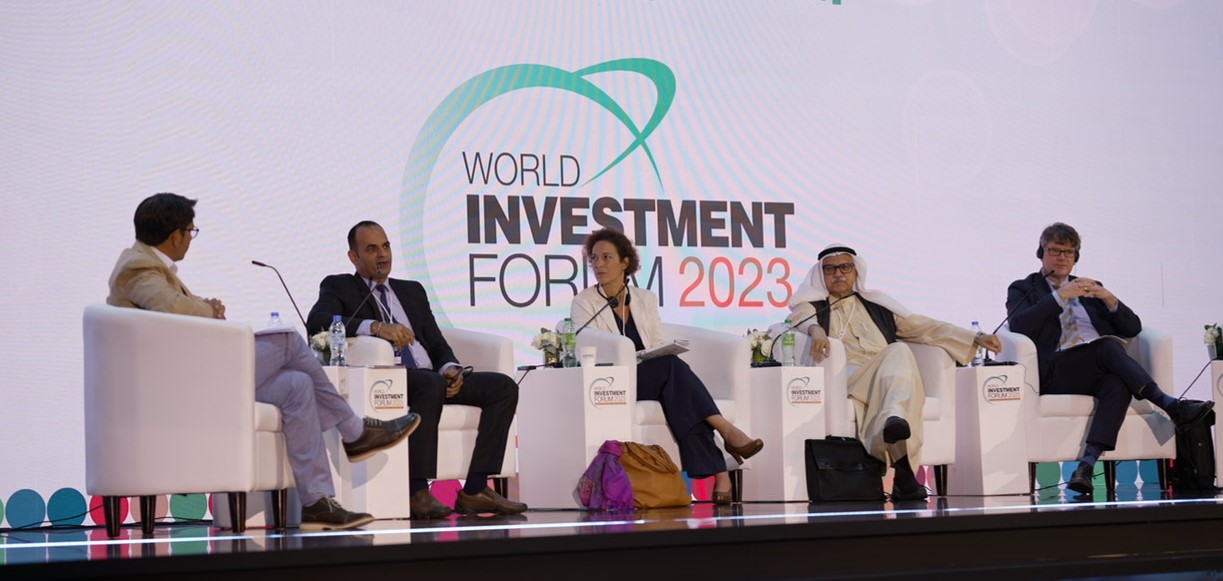How can innovative finance spark sustainable agrifood system investments?

Innovative financial solutions aimed at reshaping sustainable agrifood systems and closing funding gaps took centre stage during a discussion session organized by the Food and Agriculture Organization of the United Nations (FAO) Investment Centre at the UNCTAD 8th World Investment Forum 2023 (WIF).
In partnership with UNCTAD, FAO hosted the Investment in Agrifood Systems Forum at WIF23, with a specific focus on the urgent need to attract public and private sector investments aligned with the Sustainable Development Goals (SDGs) to transform agrifood systems for a healthier planet, population, and economy.
“This pannel discussion delved into the dynamic landscape of innovative finance and its potential to revolutionize the future of agrifood systems, with the goal to foster more equitable, sustainable, and healthier food systems,” said Mauricio Benitez, Agribusiness and Finance Investment Specialist, FAO Investment Centre, and session moderator.
Insights from innovative agrifood financing practitioners
The FAO Investment Centre plays a vital role in supporting innovative finance by advising finance entities on aligning agribusiness strategies with sustainability goals.
This encompasses extending access to untapped opportunities, enhancing due diligence, and providing investment committees with data-driven insights to strengthen the impact of innovative finance in sustainable food systems.
The discussion highlighted the need for tailored approaches to innovative finance in agrifood systems, acknowledging the interplay between public and private financing, risk-sharing, and sustainability. It emphasized the use of blended public and private sector funds as an innovative approach in financing sustainable agriculture.
A diverse panel of representatives from various financial organizations underscored the importance of focusing on de-risking mechanisms, tailored approaches, sustainability, and inclusion.
Camille Huret, Co-Founder of Beyond Finance, shared insights into their approach – particularly focusing on climate resilience. Beyond Finance's climate resilience strategy encompasses various sectors, including financial inclusion, access to water, sustainable agriculture, and clean energy. Sustainable linked loans were highlighted as a means to set targets and engage women in both production and consumption.
Dr. Abdulredha M. Bahman, a senior advisor at the Kuwait Fund for Development, emphasized their role in financing sustainable agriculture projects, prioritizing comprehensive feasibility studies that consider the needs and input of beneficiaries, especially small farmers. Understanding and engaging directly with communities and beneficiaries was stressed as crucial in supporting governments' agricultural projects.
Dr. Sachin Kumar Sharma, an Associate Professor at the Indian Institute of Foreign Trade, highlighted the links between innovative finance and repurposing agricultural subsidies to promote sustainable agriculture and food systems. Sharma also discussed the ongoing negotiations at the World Trade Organization (WTO) to discipline agricultural subsidies, noting that disciplining subsidies can be complex, as countries confront different challenges and priorities.
Coordinated partnership and research
Regional and global approaches were emphasized as effective ways to enhance the impact of sustainable agriculture efforts. Collaboration between countries, international organizations, and regional bodies was seen as a means to create more effective strategies.
Michael Dethlefsen, Head of Division of Innovative Finance and International Financial Institutions at UNIDO, highlighted the importance of embedding innovative finance instruments and schemes to complement traditionally funded technical cooperation projects, in designing impactful interventions in sustainable agriculture.
The discussion underscored that financial strength and partnerships are crucial. Public-private partnerships can implement policies, fund research, and design innovative approaches to address critical issues such as climate change mitigation, diversification of agriculture, and subsidies affecting farm incomes.
Mitigating risks and exploring new avenues
Panelists agreed on the need for increased funding for sustainable agriculture but emphasized the importance of effective de-risking strategies.
Huret emphasized that investing in climate resilience is a way to reduce risks in agriculture. She also looked at ways to reduce risks on both the asset and liability sides. On the liability side, she proposed using blended finance and first loss tranches to make investments safer for senior investors. On the asset side, she recommended diversification and granularity as essential strategies to reduce risks. This involves spreading investments across various sectors, countries, and commodities to make sustainable agriculture initiatives more resilient.
At the investment level, she suggested structuring products with terms and conditions tailored to the sector and utilizing innovative alternative collateral.
Sharma emphasized the impact of subsidies on farm incomes, particularly in developing countries, and stressed the importance of designing innovative finance mechanisms to mitigate these effects and support smallholder farmers' economic well-being.
Panelists united in their belief that climate change resilience is paramount in financing sustainable agriculture. Building climate resilience into agricultural practices and investments is crucial for long-term sustainability.
The discussion highlighted the multifaceted nature of innovative finance for sustainable agriculture. Collaboration between the public and private sectors, innovative approaches, and addressing policy, research, and climate change are essential steps toward a more sustainable and resilient agrifood sector.
